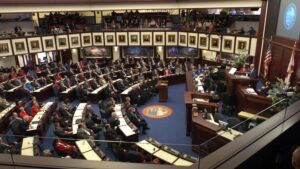BLOG
Each year, our elected state representatives and senators meet in Tallahassee for a legislative session where they review and debate an extensive amount of proposed bills, only to send a few of those bills to the governor to be signed into law. For the third year in a row, our elected lawmakers will be discussing a bill that has once again resurfaced, and if passed, may have a significant impact on community associations’ wallets.
House Bill 483 — also known as Senate Bill 398 or “the home tax” bill — proposes to place a considerable amount of requirements relating to the issuance of estoppel certificates on the condominium, cooperative or homeowners association responsible for preparing them. If signed into law, community associations will need to be both financially and operationally prepared to abide by the stringent changes set forth in the bill.
An estoppel is a legally binding document prepared by a community association or its agent that discloses any liens, overdue assessments or any other money owed to the association, such as late fees and attorney’s fees. Estoppels are required by title companies in standard real estate transactions in order to inform the seller and buyer of any outstanding financial obligation(s) on the unit or parcel. If prepared incorrectly, the community association could be liable for miscalculated or incomplete balances, resulting in a loss for the association.
Contrary to some people’s beliefs, estoppels aren’t generated by the push of a button. They take time and precision to prepare, which is why a bill that shifts even more of the burden on the association could be detrimental.
 One of the main components of this proposed bill is to mandate more rigorous deadlines for the preparation of estoppels. Currently, associations have 15 days to prepare and deliver an estoppel once it is requested. The bill would shorten this period to 10 business-days, which could be difficult for associations of varying sizes and levels of sophistication, as some will be anchored by antiquated bookkeeping or a lack of resources.
One of the main components of this proposed bill is to mandate more rigorous deadlines for the preparation of estoppels. Currently, associations have 15 days to prepare and deliver an estoppel once it is requested. The bill would shorten this period to 10 business-days, which could be difficult for associations of varying sizes and levels of sophistication, as some will be anchored by antiquated bookkeeping or a lack of resources.
The bill also provides a template for required information to be included in the estoppel, including any existing rule violations, approval requirements for sale or lease, and utilities included with assessments. Additionally, under the proposed law, estoppel preparation fees will be capped at a set amount, leaving the owners of an association to pay the bill for any differences in costs for the creation of an estoppel. Eventually, this could lead to higher assessments being placed on those residing in the community in an effort to offset the additional expenses incurred in the preparation of extensive estoppels.
Rushing the estoppel preparation process can also contribute to miscalculations of the total sums owed, adding to the association’s financial responsibilities because any discrepancies would have to be written off by the association.
The most notable and harmful requirement, however, involves imposing that associations pre-pay estoppel costs when services are rendered. This would mean that associations will have to advance money from their own account, regardless of whether or not the transaction goes forward, and wait to be paid from the proceeds of the closing. However, should the sale not close, the association may either seek reimbursement from the seller or be forced to lose the money it advanced. This will inevitably lead to higher assessments in order to make up for these losses.
Despite the significant push from the interest groups funding this bill, lawmakers still have a duty to listen to their constituents. We encourage community association members to reach out to their state representatives and senators to voice their concerns regarding how this bill will negatively impact their communities.

